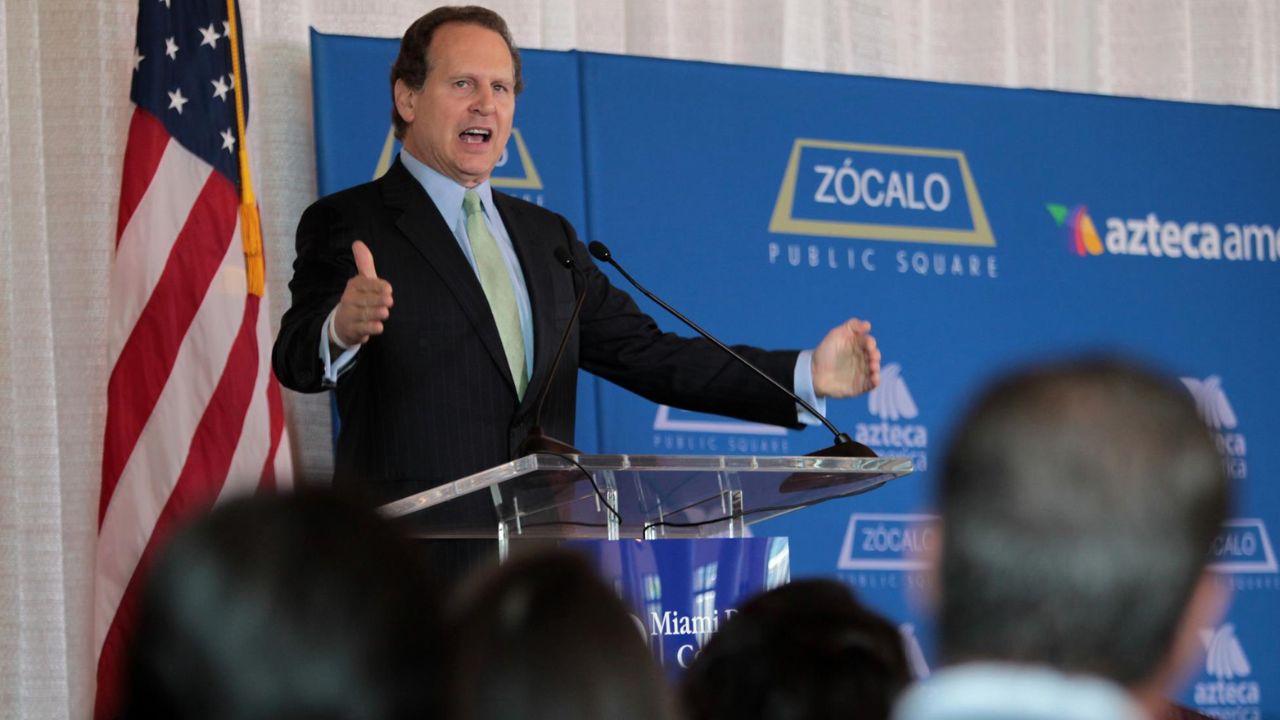 11 months ago
Latest News
By akhabartime
201 Views
11 months ago
Latest News
By akhabartime
201 Views
Former Representative Lincoln Diaz-Balart: A Legacy of Political Service and Advocacy for Cuban Americans
Former U.S. Representative Lincoln Diaz-Balart, a towering figure in the Cuban-American community and a stalwart advocate for U.S. policy on Cuba, passed away at the age of 70. His death marks the end of an era of passionate political activism that spanned decades and left an indelible mark on U.S. law and foreign policy. Diaz-Balart, who served Florida’s 21st Congressional District for 18 years, is remembered not only for his commitment to his constituents but also for his tireless efforts to promote democracy and human rights on the global stage, particularly concerning Cuba and Latin America.
His passing was announced by his brother, Rep. Mario Diaz-Balart, who represents Florida’s 25th Congressional District. The loss of Lincoln Diaz-Balart reverberates through both the political world and the Cuban-American community. As a close-knit family of public servants, the Diaz-Balart brothers—along with their late father, Rafael Diaz-Balart, a prominent Cuban politician—were emblematic of a dynasty dedicated to upholding the values of liberty and justice. In this article, we take a closer look at Lincoln Diaz-Balart’s political career, his achievements, and the lasting impact of his work.
From Cuban Refugee to Political Leader
Born on August 13, 1954, in Havana, Cuba, Lincoln Diaz-Balart’s story is one of resilience and transformation. He was just a young boy when his family fled Fidel Castro’s regime and sought refuge in the United States. The Diaz-Balart family, like many Cuban exiles, came to America with hopes of finding freedom and opportunity that had been denied to them under the communist regime in Cuba. The family initially settled in New Jersey before moving to Florida, where Lincoln would later begin his political career.
In his early years, Diaz-Balart’s political views were shaped by the struggles his family endured as exiles and the oppression they witnessed in Cuba. He was educated at the prestigious Harvard College and later earned his law degree from the University of Miami School of Law. Lincoln Diaz-Balart’s education and professional background gave him a solid foundation for his future in politics, but it was his commitment to the Cuban-American community that would define his career.
Initially, Lincoln Diaz-Balart’s political involvement began with his support for the Democratic Party. He served as a leader within the Florida Young Democrats and even ran for the Florida State Legislature in 1982. However, his shift to the Republican Party in 1985 marked the beginning of a new chapter in his political journey. The growing frustrations with the Democratic Party’s stance on Cuban-American issues led him to realign himself with the Republican ideology, which better aligned with his views on communism, freedom, and U.S. foreign policy.
In 1986, Lincoln Diaz-Balart was elected to the Florida House of Representatives, where he quickly gained a reputation as a tough advocate for conservative values. Throughout his tenure in state politics, Diaz-Balart focused on legislation that addressed issues affecting both Floridians and the broader American public. He sponsored laws that toughened sentences for crimes committed against law enforcement officers, increased penalties for drug-related offenses, and promoted measures that facilitated homeownership through low-interest loans.
But perhaps his most notable contributions at the state level were those related to Cuba. As a Cuban-American legislator, Diaz-Balart was deeply invested in the U.S. government’s policies regarding his homeland. He fought tirelessly to ensure that U.S. sanctions on Cuba remained intact as a way of pressuring the Castro regime to respect human rights and allow democratic reforms. Diaz-Balart’s early stance on Cuba would become a hallmark of his later work in the U.S. House of Representatives.
A Career in the U.S. House of Representatives
In 1992, Lincoln Diaz-Balart was elected to the U.S. House of Representatives, succeeding Claude Pepper, who had served Florida’s 21st Congressional District for over two decades. Diaz-Balart’s election marked the beginning of a long and influential career on Capitol Hill. He served in the House for 18 years, from January 1993 to January 2010, during which time he became one of the leading voices in Congress on issues related to Cuba, Latin America, and U.S. foreign policy.
Throughout his career, Diaz-Balart was known for his unwavering stance against the Castro regime. He was a fierce advocate for human rights in Cuba and worked relentlessly to promote U.S. policies that would pressure the Cuban government to change. In 1996, he played a key role in the passage of the Helms-Burton Act, which strengthened the U.S. embargo against Cuba and sought to discourage foreign investments in the island nation. This act was one of the most significant pieces of legislation related to Cuba during Diaz-Balart’s tenure, and it firmly established his reputation as a staunch anti-communist.
Diaz-Balart’s work was not confined to Cuba. He was also deeply committed to addressing issues affecting other parts of Latin America. In 1997, he co-authored the Nicaraguan Adjustment and Central American Relief Act (NACARA), which provided legal protections for Central American immigrants who had fled violence and political instability in their home countries. The act offered temporary residency status to thousands of immigrants, allowing them to build a better life in the United States.
His work on immigration reform also extended to broader issues, advocating for the rights of immigrants and their ability to seek refuge in the U.S. without fear of persecution. Diaz-Balart’s comprehensive approach to immigration policy sought to balance the need for security with the country’s historic role as a refuge for those fleeing oppressive regimes.
Diaz-Balart was also a vocal advocate for the protection of the United States’ democratic values, often opposing policies that he felt compromised the country’s international leadership. Whether it was in the context of Cuba or broader geopolitical concerns, his commitment to the preservation of American ideals remained a central tenet of his legislative agenda.
A Personal Commitment to His Roots
One of the most striking aspects of Lincoln Diaz-Balart’s political career was his personal commitment to the Cuban-American community. His leadership was not only defined by policy achievements but also by his deep connection to the issues affecting Cuban-Americans in Florida and beyond.
In 2003, Lincoln Diaz-Balart co-founded the Congressional Hispanic Leadership Institute (CHLI) alongside his brother Mario, with the goal of promoting Latino leadership within the United States. Through CHLI, Diaz-Balart sought to create a platform for Hispanic-Americans to have a more prominent role in American politics, ensuring that their voices were heard on Capitol Hill.
His work with CHLI was not only focused on promoting the interests of Cuban-Americans but also aimed to elevate the broader Latino community, advocating for their inclusion and representation at all levels of government. Diaz-Balart’s leadership within the Hispanic community helped pave the way for other Latino politicians to gain prominence and influence in U.S. politics.
A Lasting Legacy
When Lincoln Diaz-Balart announced his retirement from Congress in 2010, his legacy was already firmly established. His tenure in the House of Representatives had left an indelible mark on U.S. policy toward Cuba and Latin America. He had built a reputation as a principled and steadfast politician who always put the interests of his constituents—and the values of democracy and freedom—above all else.
In the years following his retirement, Diaz-Balart continued to advocate for the causes that had defined his career, offering his expertise and insights on U.S.-Cuba relations and Latin American foreign policy. His death, however, marks the end of an era for those who were fortunate enough to witness his work firsthand.
Lincoln Diaz-Balart’s legacy extends far beyond his time in office. He leaves behind a profound impact on U.S. foreign policy, the Cuban-American community, and the political landscape of Florida. His commitment to democracy, human rights, and the well-being of those silenced by oppressive regimes will continue to inspire future generations of public servants.
Rep. Mario Diaz-Balart’s tribute to his late brother reflects the deep love and admiration felt for Lincoln by those who knew him. He wrote, “Lincoln’s profound love for the United States, and his relentless commitment to the cause of a free Cuba, guided him throughout his life and his 24 years in elected public service, including 18 years in the U.S. House of Representatives. We will miss him infinitely.”
In conclusion, Lincoln Diaz-Balart’s life and work will remain a touchstone for all those who value freedom, justice, and the pursuit of democracy. His contributions to American politics, especially in the realms of U.S.-Cuba relations and Latin American policy, will endure for generations to come.
